

ESG Statement 2024
EDC Poul Erik Bech Holding A/S
Introduction
Welcome to EDC Poul Erik Bech’s Sustainability Report 2025, covering the year 2024. In this report we present our initiatives and results within ESG: Environmental, Social and Governance.
2024 was marked by significant change and new sustainability expectations in business – including for EDC Poul Erik Bech. Earlier in the year we faced new regulatory requirements for ESG reporting due to the EU Corporate Sustainability Reporting Directive (CSRD). Before year-end, however, the “Omnibus” bill proposed changes to reporting requirements, including a deferral of the mandatory ESG reporting obligation.
Despite the deferral, we have chosen to prepare a sustainability report structured in line with the Voluntary VSME Standard (VSME). We want to be proactive and support our partners and stakeholders in their ESG work. A shared framework ensures greater transparency, comparability and credibility across companies and industries, and allows us to demonstrate our commitment to sustainability.
While this is not our first ESG report, it is the first that follows the VSME Basis module and selected elements of the Expanded module (VSME December 2024). We have prepared our first climate account and quantified our Scope 1 and 2 CO₂ emissions. This marks a milestone towards a lower environmental footprint and a stronger focus on climate-responsible operations.
Sustainability for us is not only about the environment – it is also very much about people. Our social initiatives are a key priority, where the EDC Poul Erik Bech Foundation plays a central role. The Foundation supports local communities and social initiatives wherever we operate, thereby actively creating value for society – work that is deeply rooted in our corporate DNA and ESG strategy.
Thank you for reading we hope this gives you a good insight into our sustainability work.
This statement is prepared on a consolidated basis and covers the Group’s total activities and entities, including the parent company and its subsidiaries.
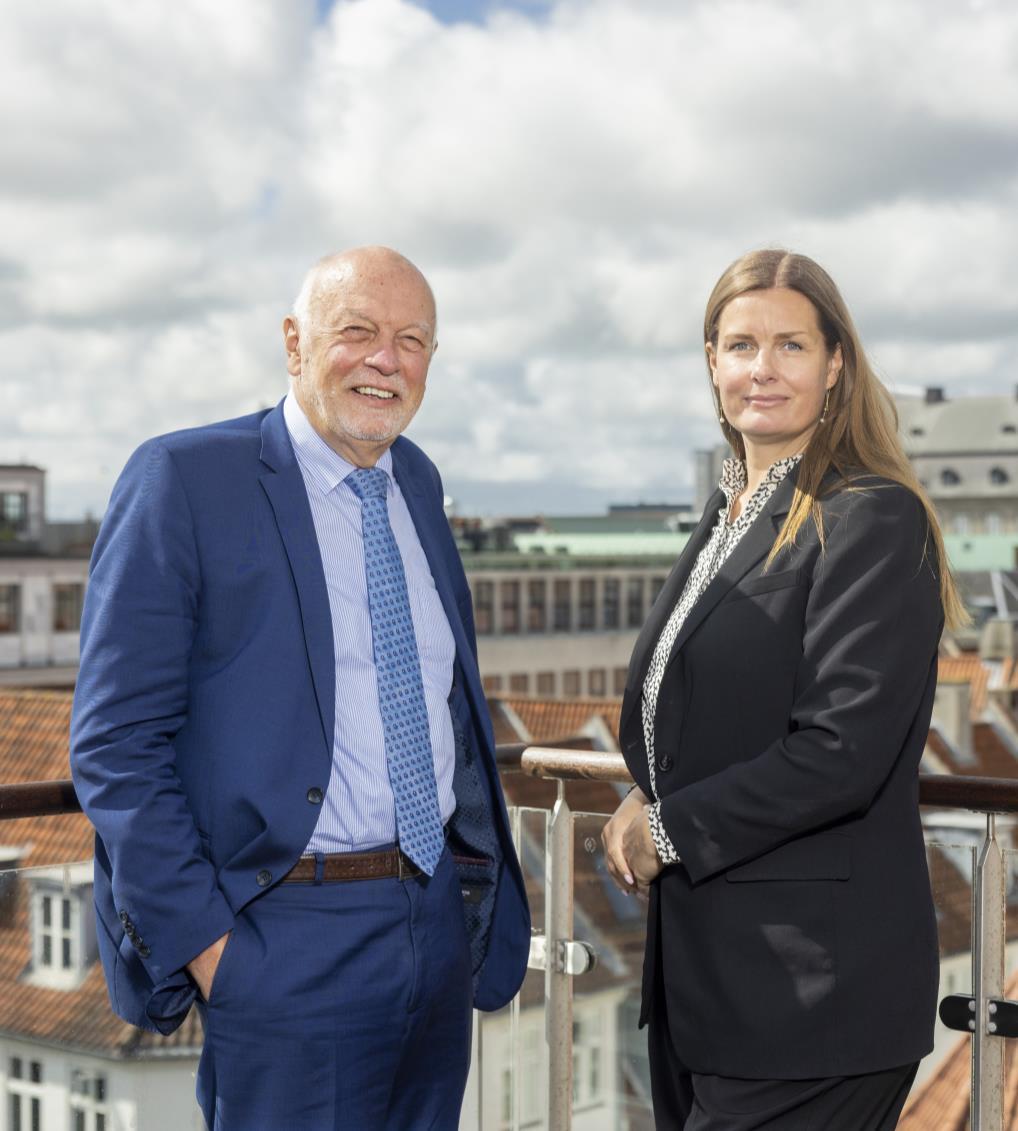
About EDC Poul Erik Bech
Established in 1978, EDC Poul Erik Bech is Denmark’s largest – and only nationwide – real estate agency, with residential branches and commercial centres across the country. The business was founded by Poul Erik Bech on the values of diligence, ethics and good business practice – principles that still underpin our daily work and our approach to clients and partners.
A partner-driven company with local roots
We are organised as a partner-driven company where experienced, engaged local partners co-own the individual residential branch or commercial centre. This structure is not just a business model – it is a core part of our culture and identity. Local presence and ownership foster strong personal engagement with both clients and the communities we serve. In 2024 we employ over 600 people – equivalent to 563 FTEs – and our more than 140 partners represent a wide range of experience and competencies.
Independence and foundation ownership
EDC Poul Erik Bech is independent of banks, mortgage institutions and investment companies and is Denmark’s only foundation-owned real estate agency. The majority of the company is owned by the EDC Poul Erik Bech Foundation – a non-profit foundation that donates funds annually to social and cultural causes nationwide. Our ownership structure enables long-term stability and the freedom to think sustainably and responsibly, to the benefit of customers, employees and society.
Diligence is a culture that permeates the entire company. Our employees do their utmost to sell our clients’ homes or commercial properties efficiently and with the best possible outcome.
Ethics means that you can place your trust in us: in the way we conduct ourselves, in our seriousness, and in the way we represent our clients in a trustworthy manner towards potential buyers.
Good business practice is ensured by dedicated and well-trained employees, whose performance and negotiation skills deliver high quality and the best possible results for our clients.
Basis of Preparation
EDC Poul Erik Bech Group
EDC Poul Erik Bech Holding A/S is a group consisting of several entities and departments that together form a strong and resilient real estate agency covering residential brokerage, commercial brokerage, project departments, LEA Ejendomspartner, and Ejendomsselskabet PEB ApS.
The EDC Poul Erik Bech Foundation owns 60% of EDC Poul Erik Bech Holding A/S; the remaining 40% are owned by Poul Erik Bech (10%) and Jane Bech (30%).
Key activities
The Group is structured around the following key units and activities:
• Ejendomsmægleraktieselskabet Poul Erik Bech – residential brokerage nationwide via our branches.
• Holdingselskabet Poul Erik Bech Erhverv A/S – holding company for commercial activities, including brokerage and advisory on commercial and investment properties.
• Ejendomsadministrationsselskabet LEA Ejendomspartner A/S –property administration company managing residential and commercial properties as well as cooperative and owner-occupied associations under Poul Erik Bech Erhverv Holding A/S.
• Ejendomsselskabet PEB ApS – owns premises from which we operate our real estate business.
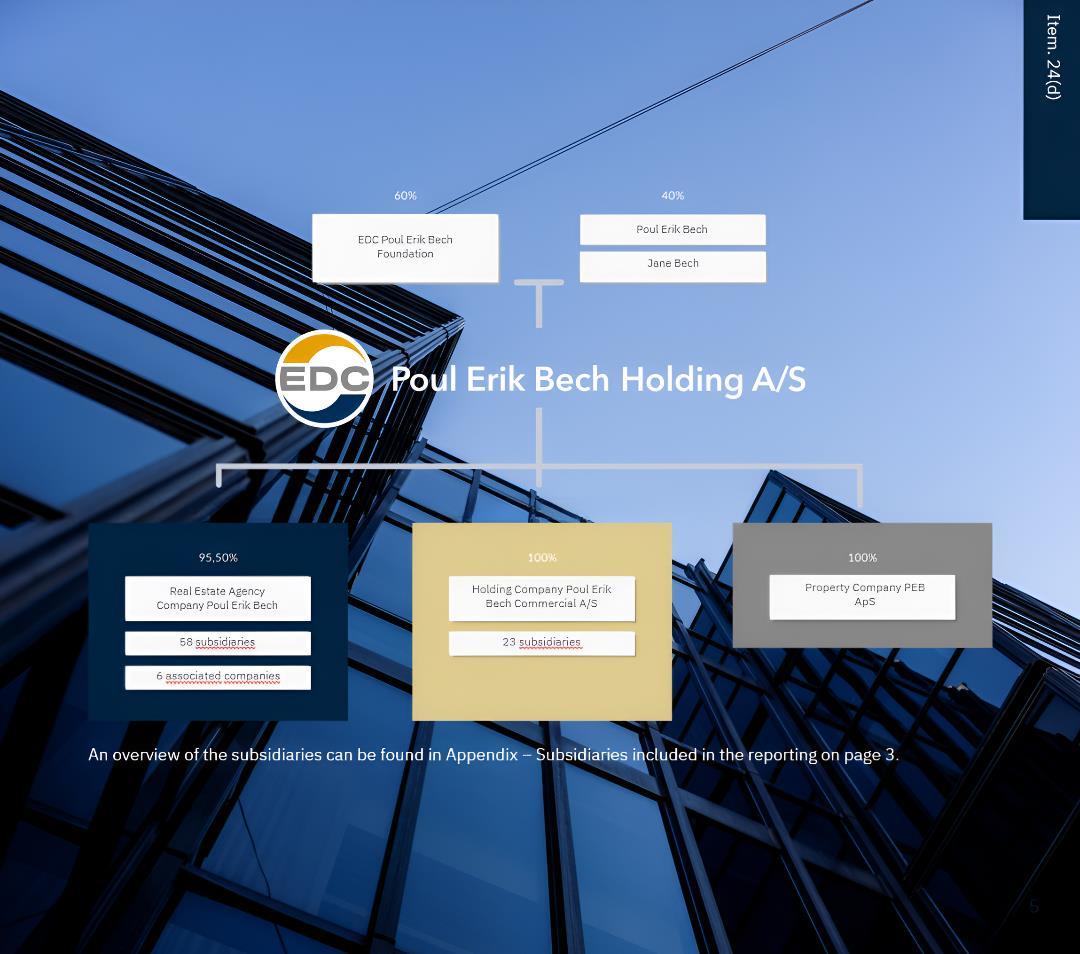
EDC Poul Erik Bech Foundation
Erik Bech
Bech
EDC Residential Poul Erik Bech EDC Commercial Poul Erik Bech
Basis of Preparation —
Voluntary Reporting
At EDC Poul Erik Bech, we have chosen to voluntarily prepare an ESG statement – not because we are legally required to do so, but because we see it as a natural part of our responsibility as a large, nationwide player in the real estate sector.
We want to be a proactive and transparent company that takes responsibility for our impact on society and the environment –even though our business is neither energy-intensive nor production-based. We recognize that our daily operations, office consumption, and other activities have an environmental impact that we must address and actively work to reduce.
Our decision to report on ESG matters is also intended to help create greater transparency and documentation within our industry. We do not merely want to respond to external demands and expectations, but to demonstrate that we take our role seriously.
By mapping and documenting our emissions and ESG-related issues, we aim to establish a solid foundation for future decisions and improvements.
ESG Development at EDC Poul Erik Bech
Our sustainability journey has only just begun. We have not yet reached the finish line when it comes to all indicators and reporting across environmental, social, and governance aspects, but we have taken the first important steps. The sustainability landscape is developing rapidly, and we will seek to adapt continuously. The first step in our ESG work has been to gain an overview and map our existing conditions within the three areas. This is crucial both to identify where we can make a real difference and to highlight the many good initiatives we are already engaged in, but which previously have not been systematically measured or documented.
We have now established the necessary structures and processes
for data collection and reporting, enabling us to measure our efforts and progress going forward.
With this ESG report, we have set a baseline for what we measure and how we measure it. In the coming years, we will continue to improve data quality and strengthen our insights, so we can make sustainable decisions on an informed and documented basis. We will continuously evaluate and adjust our work to ensure that our ESG efforts are both ambitious and realistic.
We view ESG reporting as a strategic tool that helps strengthen our business and our customer relationships. It allows us to work more purposefully with these areas and ensure that they are reflected in the way we conduct business. By taking this step now, we create a stronger foundation for meeting future requirements and expectations, and for contributing to the development we are part of.
Key information about EDC Poul Erik Bech Holding A/S
Corporate form
Limited liability joint-stock company (LLJSC)
NACE sector code(s) EDC L642120 Non-financial holding companies
M683110 Real estate agency activities
M683210 Management of real estate on a fee or contract basis
Location of shops and centres
A list of addresses and geolocations of significant assets and facilities owned, leased, or controlled by EDC Poul Erik Bech can be found in Appendix – Overview of locations on page 35.
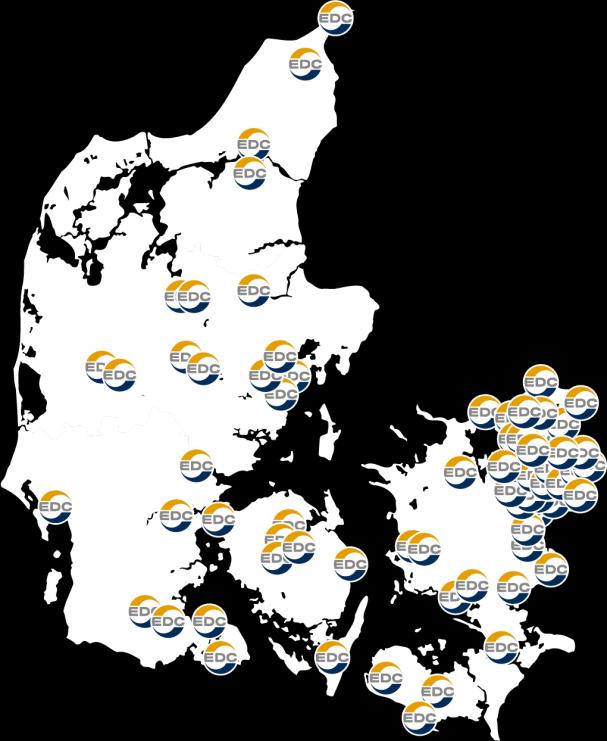
Strategy and Business Model
Our main products and services
We offer a wide range of real estate–related services covering both the residential and commercial segments, as well as property management and project development. Our business areas are organized into four key units:
Residential (Ejendomsmægleraktieselskabet Poul Erik Bech)
EDC Residential focuses on the sale and rental of residential properties. The primary services include:
• Sale and rental of private homes.
• Valuation of homes for financing, family transfers, estates, and more.
• Marketing of residential properties.
• Advisory services for buyers not purchasing through us.
Commercial (Holdingselskabet Poul Erik Bech Erhverv A/S)
EDC Commercial handles the purchase, sale, rental, and valuation of commercial properties. Our services include:
• Brokerage of office, warehouse and logistics, industrial, retail, agricultural, hotel, camping, and investment properties.
• Advisory services for commercial transactions.
• Valuations, market analyses, and investment advisory.
• Strategic advice on large-scale real estate projects.
LEA Ejendomspartner A/S
LEA Ejendomspartner provides professional property management, including:
• Operation and administration of residential and commercial properties, housing cooperatives, and owners’ associations.
• Financial management and budgeting.
EDC Project
EDC Project primarily works with the rental and sale of newly built residential units, as well as the re-letting or sale of vacant dwellings. Activities include:
• Participation in advisory teams with project owners, architects, and others.
• Portfolio management and reporting.
Our main markets, customers, and business relations
We operate primarily in Denmark, where we have a nationwide presence through our residential shops and commercial centres. We are active in both the B2B and B2C markets, serving a wide spectrum of clients – from private homeowners to large investors, institutional clients, and public authorities.
Internationally, we collaborate with JLL (Jones Lang LaSalle), which operates in more than 80 countries and is one of the world’s largest real estate consultancies. This partnership strengthens our presence and expertise in the international commercial property market and ensures access to global networks and investors.
Suppliers / partners
We primarily collaborate with stakeholders in the construction sector, as well as architects, engineers, lawyers, surveyors, and providers of software solutions.
Distribution
channels
We primarily distribute our services through our residential shops, commercial centres (retail channel), digital platforms (including edc.dk, poulerikbech.dk, and targeted campaigns), as well as through personal advisory processes and networking activities.
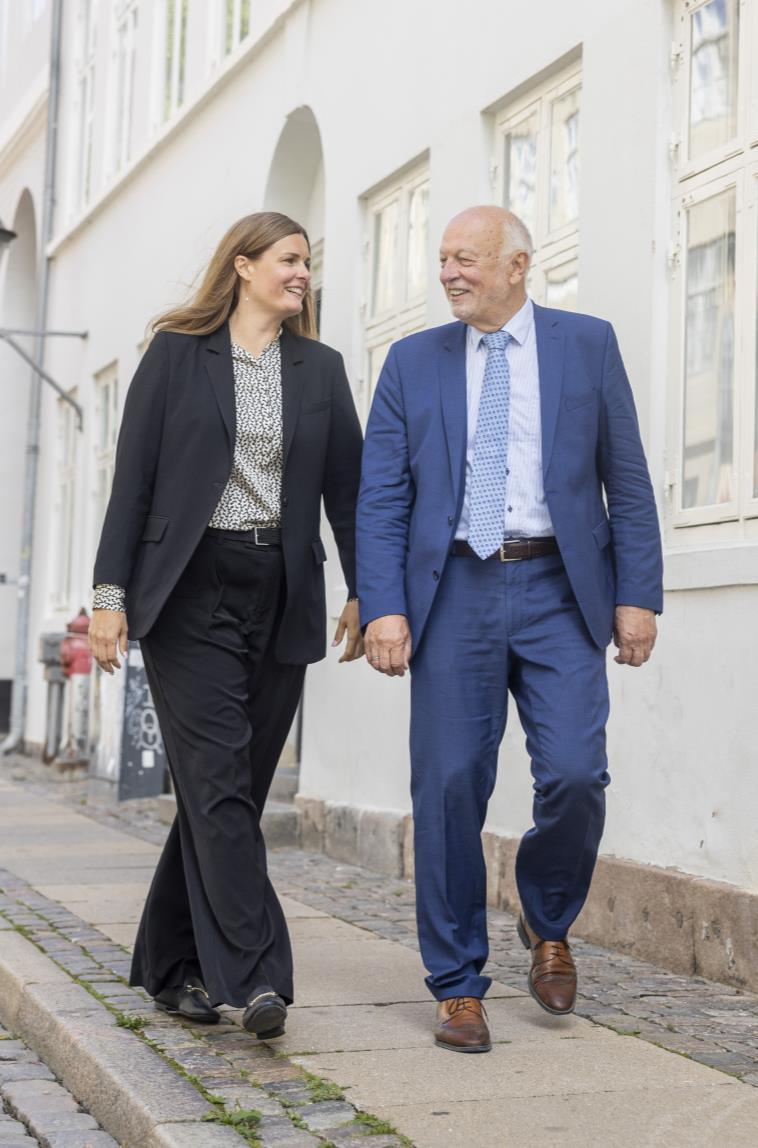
Efforts, Policies, and Initiatives for transitioning to a more Sustainable Economy
Existing sustainability practices
We strive to integrate sustainability as a natural part of our daily operations and community engagement. In recent years, we have implemented several initiatives with a focus on environmental, social, and governance aspects:
Environmental initiatives in daily operations
Our offices across the country vary significantly in age, size, and number of employees. At our headquarters on Bremerholm, where around 150 people work, we have introduced several environmental initiatives, including temperature control, demanddriven ventilation, intelligent lighting, water consumption monitoring, and measures against food waste in our canteen operations.
At other locations, we have over the years gradually replaced lighting with LED solutions, and most premises are equipped with thermostat-controlled heating. We are in the process of introducing intelligent lighting systems. In 2024, this was implemented at 2 locations, and additional sites will have intelligent lighting installed in 2025. We prioritise circular economy principles through environmentally certified printed materials, demand-driven procurement, and the reuse of electronics and office furnishings. On the social side, we place a high priority on employee well-being and working environment. We conduct annual workplace assessments and have established routines for continuous monitoring of employee satisfaction. This provides a solid basis for identifying needs and launching relevant initiatives.
Social responsibility through the foundation
As a foundation-owned company, giving back to society is part of our DNA. Through the EDC Poul Erik Bech Foundation, we support projects that create community and security for vulnerable children and young people.
In 2024, the Foundation received DKK 10 million from the brokerage business for social purposes. We aim to maintain this level in 2025.
Advisory services for clients
We also aim to contribute to the green transition in the real estate industry. We provide counsel on sustainable initiatives, where ESG is included in customer dialogue, leases and investor profiles. We prioritise having a concrete and value-creating conversation about sustainability with the relevant commercial customers.

Embedding ESG in the organisation
Finally, we have established an ESG Committee with employees from multiple departments. The committee supports the integration of ESG throughout the organisation and serves as a sparring partner for management. It contributes to the development of new initiatives and ensures that sustainability is firmly embedded in our daily operations.
Forward-looking initiatives and plans
We are continuously working to strengthen and expand our sustainability efforts, with the ESG Committee playing a central role. In the coming period, we will focus on the following initiatives:
Strengthening employee competencies
We want to ensure that our employees have the right prerequisites to actively participate in the sustainable transition. Therefore, we will enhance our internal ESG knowledge and environmentally friendly work practices through training and knowledge-sharing.
Strengthened collaboration across locations
We are working systematically to ensure that sustainable work processes and policies are implemented and, where possible, standardized across our residential shops and commercial centres.
Efforts, Policies, and Initiatives for transitioning to a more Sustainable Economy -
Goals and follow-up
We are committed to ensuring that our sustainability initiatives do not remain merely good intentions – they must be translated into tangible results that can be measured, monitored, and improved over time.
To secure this, we apply a range of systematic measurement methods and follow-up structures:
Employee well-being and work environment
HR distributes our monthly Well-being Compass to all employees. It contains a set of standard questions that provide HR with a comparable data basis and the ability to monitor developments closely. If challenges arise, HR can quickly respond with dialogue and concrete initiatives. The Well-being Compass is a confidential tool between each employee and HR.
Environmental data and climate accounts
As part of our reporting, in 2024 we prepared our first climate accounts for Scope 1 and 2. This marks an important step toward creating insight into our direct and indirect emissions. Based on this, we can now begin to set targets and identify areas where we can make a real difference.
ESG Committee
The group has overall responsibility for ensuring progress and coordination. It follows up on ongoing initiatives and ensures that our ESG objectives are integrated into both strategy and practice.
Social contributions and local engagement
Through the EDC Poul Erik Bech Foundation, we measure and document our social impact. The foundation enables us to support initiatives that create value in local communities, and our aim is to maintain the same level of support and engagement in 2025 as in 2024.
Through these measures, we aim to establish a transparent and responsible approach to sustainability, where we continuously learn, adapt, and develop –with the environment, people, and business in mind.
Sustainability Policies
Climate and environment
EDC Poul Erik Bech is committed to actively working towards energy savings, waste reduction, and efficient resource utilisation across all parts of the company in order to reduce our environmental footprint.
Circular economy
We prioritise the reuse and recycling of IT equipment, office furnishings, and materials, and we use environmentally certified products to support a sustainable and circular approach in our daily operations.
Our workforce
We foster a healthy and safe working environment through systematic follow-up, health initiatives, and a strong focus on employee well-being to ensure engagement, development, and long-term retention.
Corporate governance
Our ESG Committee and Code of Conduct ensure that we practice transparent, responsible, and ethical management, thereby strengthening governance and trust among employees, partners, and society at large.
Procurement and consumption
We select partners and suppliers with care and prioritise standardization and responsibility in our procurement processes in order to promote sustainable and ethically sound solutions.
Social responsibility
Through the EDC Poul Erik Bech Foundation, we are committed to supporting vulnerable children and young people as well as local communities, and we actively contribute to social initiatives that create positive societal value.

Environmental data
Includes VSMEs : B3 — Energy and CO₂e emissions
B6 – Water
B7 — Resource consumption, circular economy, and waste management
B4 Pollution of air, water, and soil and B5 Biodiversity has not been reported, as it is considered non-relevant.
C3 — Climate transition and C4 — Climate risks have not been reported, as no CO₂e reduction targets have been set, and no significant climate risks have been identified.
Energy Consumption
Energy consumption
EDC Poul Erik Bech’s energy consumption primarily relates to our office operations. This includes electricity, district heating, and a few fossil-based heating sources. Energy consumption covers, among other things, lighting, HVAC systems (heating, ventilation, and air conditioning), IT equipment, and other electrical installations.
The share of renewable energy in our total consumption is based on the energy mix in the electricity we purchase from our suppliers. As we operate from many different locations, often as tenants, we have limited opportunities to directly influence energy sources and building installations. Nevertheless, we continuously work to identify and make use of the opportunities we do have to reduce energy consumption wherever possible.
Our data show that energy for heating constitutes a significant part of our overall climate footprint. It is therefore a natural area of focus in our continued efforts to reduce environmental impact and support more energy-efficient operations.
Electricity
As an office-based business, electricity accounts for a central part of our total energy consumption. Our electricity use primarily relates to IT equipment, lighting, and other electrical installations supporting daily office operations.
The share of renewable energy in our electricity consumption reflects the actual composition of the power grid in the municipalities where we have offices. We therefore apply the municipality-specific share of renewable energy in our calculations, ensuring a realistic and geographically aligned reporting.
Although we have limited direct influence on energy sources in many of our leased locations, we continuously work to promote energy efficiency by monitoring energy use at the shop and centre level, enabling a more targeted approach.
Heating
The majority of our locations are heated with district heating, which generally contains a high share of renewable energy. This is due to the mix of energy sources in the district heating production of the local utilities we are connected to. A few locations use fuel-based heating. Some of these properties are owned by us, while others are leased facilities where opportunities for energy improvements are often more limited.
We continuously prepare an overview of energy-related conditions in the properties we own, including energy labels and technical
installations. Based on these assessments, we identify where there is potential for energy improvements and investments to reduce energy consumption, including heating.
This work is an integrated part of our strategy and policies to promote more energy-efficient operations and reduce our overall climate footprint. As part of this effort, we have implemented temperature regulation in our headquarters, aimed at reducing energy consumption by adapting heating to usage patterns. Temperature control is a simple yet effective tool to ensure that energy is used where and when it is needed.
CO₂e-emissions: Scope 1 and 2
In preparing our first climate accounts, we have chosen to focus on Scope 1 and Scope 2 emissions. We have prioritised the areas over which we have direct control and where we have the greatest potential to reduce our climate footprint. Scope 1 covers our direct emissions from own activities, while Scope 2 comprises the indirect emissions from purchased energy.
This first climate account forms the basis for our continued work to understand and manage our climate impact. It functions as a baseline from which we can monitor developments in our climate impact over time. The baseline also enables us to set realistic and measurable reduction targets going forward. At the same time, we are creating greater transparency regarding our climate impact and laying the foundation for a systematic and data-driven approach to our climate efforts.
CO₂e-intensity
CO₂e intensity makes it possible to track CO₂e emissions in relation to a selected parameter. Normalising emissions allows us to compare the development of CO₂e emissions regardless of the scale of operations. The CO₂e intensity is based on the sum of Scope 1 and Scope 2, as these are the direct and indirect emissions that are a direct consequence of the company’s activities. As this is the first reporting, the disclosed figures will serve as a benchmark for future reports. In particular, CO₂e emissions per revenue and per unit produced are key metrics that can be used to assess the development and effectiveness of CO₂e reduction measures.
Scope 1 refers to the direct emissions from activities that the company itself controls. These are emissions from the company’s own vehicles and its own facilities for heat production.
Scope 2 refers to the indirect emissions from purchased energy, including electricity and district heating. In this case, the emissions occur elsewhere than where the company operates—specifically at the sites where the electricity and district heating are produced.
Water Withdrawal
The company’s activities result in very low water consumption, as they are primarily office-based functions without production or waterintensive processes. Water is used solely for basic hygiene, cleaning in office facilities, and kitchen facilities, and there are no significant risks or impacts related to water use in the company’s operations. The total water withdrawal for 2024 amounts to 3,414 m³.
None of our locations are situated in areas classified as water-stressed, reflecting the generally stable and resilient water resources in Denmark. This means that our water consumption does not place pressure on local water reserves.
Thus, water consumption constitutes only a small part of our overall environmental footprint, but we recognize water as an essential resource. Water is vital for both ecosystems and society, and there is growing global attention on responsible water management. Climate change, population growth, and urbanization are increasing the pressure on water resources, including in Denmark. Therefore, it is important to use water responsibly. For this reason, we also regard the reporting of our water consumption as part of our ESG efforts at EDC Poul Erik Bech.

Resource Consumption, Circular Economy and Waste Management
As an office-based company, our resource consumption is significantly lower compared to production or industrial companies. However, this does not lessen our responsibility. We are committed to promoting responsible resource use and supporting the principles of the circular economy.
Circular management of IT equipment
Through our collaboration with CycleIT, we ensure that our used IT devices are part of a circular system. In 2024, 100% of our equipment was passed on into the circular process, of which 99% was reused and 1% recycled – no devices ended up in landfill. This resulted in a total CO₂ saving of 1,109 kg CO₂e.
Reuse and resource optimization
We have established internal procedures for the reuse of both electronic equipment and office furniture. When an employee leaves, we ensure that equipment and furniture are reused internally or donated. This reduces waste and extends the lifespan of products.
Eco-labelled printed materials and paper consumption
We set requirements for responsible paper consumption. The use of paper is a natural part of our sales-promoting activities. It is an important parameter for reaching potential customers in competition with the financial groups’ brokerage chains. To reduce our environmental footprint, our head office purchases only Swan-labelled paper, and our envelopes are FSC-certified. We continuously monitor our consumption and explore areas where it can be reduced.
Food waste
The availability of a canteen varies across locations. At our head office, we have implemented strategies against food waste, including reuse of leftovers and offering surplus food to employees. In general, we encourage our employees in individual branches and centres to be mindful of food waste in relation to their consumption and handling of food.
Circular economy is about utilising resources and materials more efficiently so that products last longer and can more easily be repaired and recycled.
Resource Consumption, Circular Economy and Waste Management -

Resource consumption
As an office-based service company, our operations do not rely on large amounts of raw materials or specific suppliers that are critical to our daily operations. Our core activities are largely based on knowledge, digital solutions and human resources. This means that material consumption is not a significant operating factor.
However, this does not mean that we abdicate our responsibility to use resources wisely. We use a range of materials typical of office operations, including paper, packaging, electronics and office supplies. Our externally produced marketing materials, such as magazines and letters, are Nordic Ecolabelled.
Data availability
The waste data presented in this report originates from properties where there is a waste agreement. It is important to note that the Group has several locations that are not included in this statement, as we currently do not have access to waste data from these units. This means that the total waste volumes for the entire group are actually higher than these calculated figures.
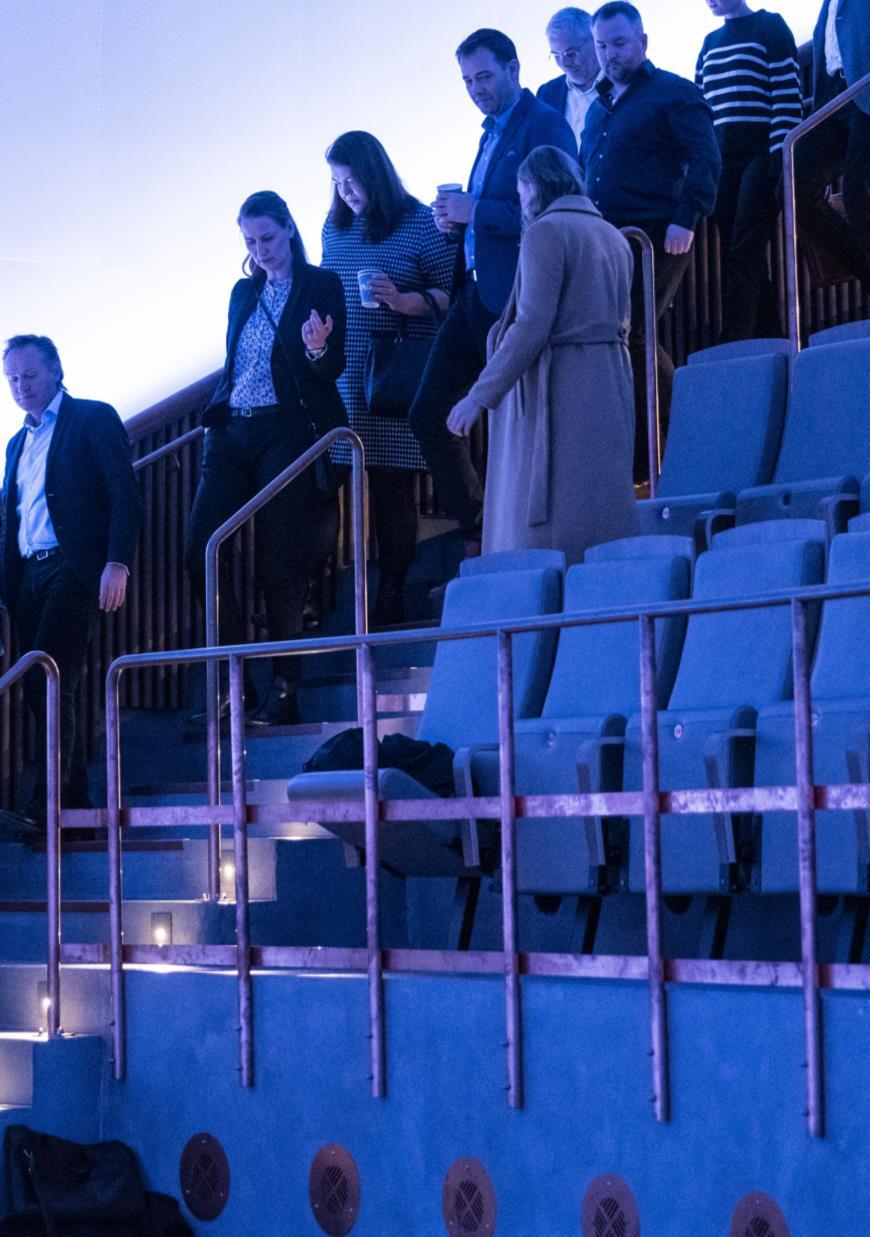
— Health and safety B10 — Remuneration, collective a greements and training C5 — Additional (general) information on the labour force
C6 — Human rights policies and processes
C7 — Serious adverse human rights incidents
General Characteristics of Our Workforce
Employee composition
At the end of 2024, the EDC Poul Erik Bech Group had over 600 employees distributed nationwide. The majority are permanent employees in full-time positions, but the organisation also includes trainees, students and interns in temporary roles. In addition, certain financial and administrative functions are carried out by employees employed by affiliated companies, and service functions such as couriers and bellhops are part of the total staffing.
The flexible composition of employees makes it possible to scale resources as needed and at the same time ensure continuous access to new skills. We attach great importance to a healthy and orderly working environment and comply with all applicable laws and collective agreements. Policies and guidelines for employment conditions and the working environment are gathered in a common employee handbook, which forms a clear and uniform basis for all employees.
Diversity
The Group has a broad age composition, ranging from young people at the start of their working lives to employees who have passed retirement age. This creates an environment where experience and new perspectives complement each other. The younger ones get the opportunity for professional development and insight into career paths, while the experienced ones contribute with stability and deep industry insight.
The gender distribution is 42% women, which is in line with the industry average. It reflects a balanced and qualificationbased recruitment practice and supports our ambition to be an inclusive workplace where skills and potential are weighted higher than gender, age or background.
Health and Safety
We attach great importance to being a responsible workplace. Our employees are our most important resource, and we work purposefully to create a healthy and safe working environment –both physically and mentally.
Handling of occupational accidents
As a brokerage and office business, there are no significant safety risks associated with the daily work tasks. Still, unfortunate incidents can occur. In the reported period, we have had three work-related accidents. These incidents have been isolated and random in nature, and they are therefore not patterns that point to systemic working environment problems. However, we take all incidents seriously and follow our internal procedures for registration, follow-up and learning to prevent accidents in the future. In addition, there have been four work-related sick leaves during the period. These incidents are part of our overall attention to the working environment and are part of the overall picture of the employees' working conditions and well-being.
We work continuously to ensure a good framework for occupational safety, including by keeping our office environments orderly and accessible, and by promoting a culture where we take care of ourselves and each other.
Health and prevention
In addition, we offer all employees health insurance, which provides access to a range of health services, including treatment and counselling, if the need arises. It is part of our overall effort to support the well-being of employees and ensure that help is easily accessible.
A good climate of cooperation
We believe that a good working environment is also about cooperation, respect and a positive tone. Therefore, we prioritise a well-functioning collaborative climate where there is room for dialogue, recognition and shared responsibility for a good working life.

Employee satisfaction and retention
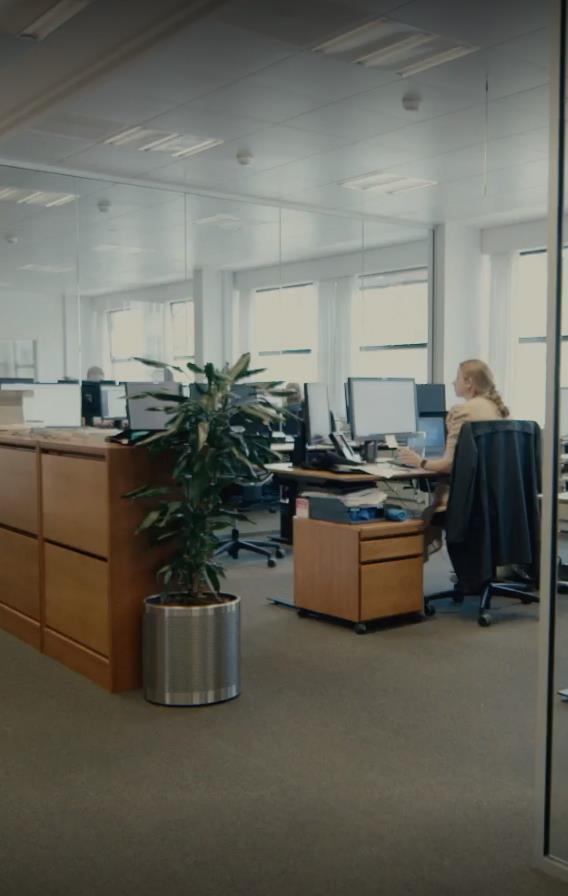
Our people are at the heart of our business. There must be room for the individual employee to have the opportunity to develop professionally and personally throughout his or her employment. It is our ambition to offer a working environment where employees thrive, engage and see long-term career opportunities.
We are proud that many employees choose to stay with us for many years – an expression of the stability, cohesion, and job satisfaction that characterizes our organisation. The average length of service among employees is 7.4 years, and we see this as a result of our targeted efforts in development, management, and working environment.
Every year, we celebrate our employees' anniversaries across the organisation. All employees are invited to the anniversary parties, where we pay tribute to the anniversaries with individual speeches. In 2024, we were able to celebrate one employee with a 40th anniversary, two with a 25th anniversary, and several colleagues with a 10th anniversary.
We also offer targeted development courses and clear career paths that support the individual's professional ambitions and competence development.
Although we have a high level of employee seniority, we are also aware of the challenges that may exist at the beginning of
employment. In 2024, we saw that 18% of the resigned employees had been with the company for less than 12 months. This is an area we follow closely and continuously evaluate. We work to strengthen the onboarding process, alignment of expectations, and the introduction to our culture and workflows, so that new employees get off to a good and safe start.
Systematic work environment efforts
We have established a working environment organisation that works systematically to ensure a good physical and mental environment. Workplace assessments (WPAs) are carried out, where we examine a wide range of conditions – from the content and organisation of the work to physical conditions and experiences of offensive behaviour. The results are actively used to identify focus areas and opportunities for improvement.
Since the end of 2024, HR has also introduced monthly well-being surveys, which provide an ongoing insight into the employees' experience of the working environment. This data can be included in our ESG reporting in the future and form the basis for concrete improvement initiatives.
Seniority
Average seniority 7.4 years
Resignations of new employees
Employee satisfaction and retention —
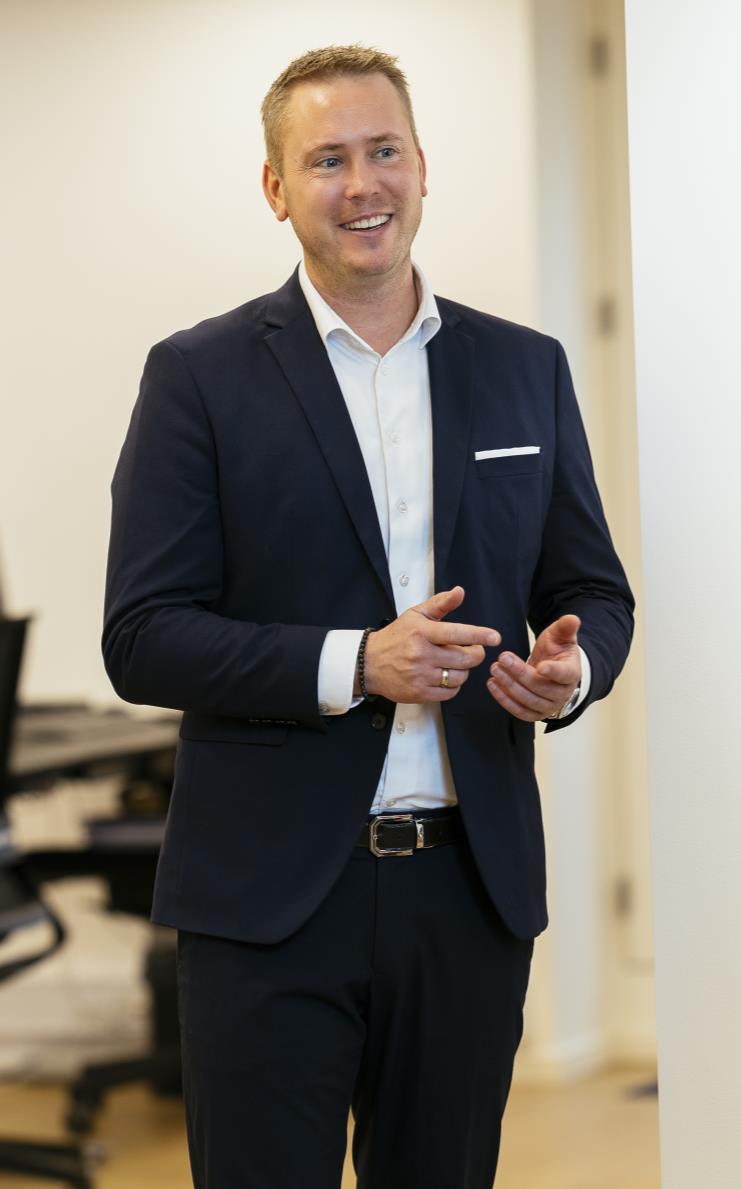
Employee retention is a key focus area for us. We want to be a workplace where people thrive – both professionally and personally – and where we create long-term relationships based on mutual trust, flexibility and care.
Life phases and maternity leave
Maternity leave is a natural part of many employees' lives, and in 2024 we had 47 employees who went on maternity leave – of which 45 returned after the end of their leave. It reflects a strong attachment to the workplace and a trusting relationship between employees and management.
We prioritise individual dialogue before, during and after maternity leave to ensure a safe and flexible return. Among other things, working hours, place of work and any need for adjustments are discussed. Especially for administrative functions, we offer flexible arrangements that support the balance between work and family life.
In 2024, 29 employees completed their maternity leave – 20 women and 9 men. The women took an average of 40.6 weeks of parental leave and the men 10.5 weeks.
Relief fund and collegial care
Our social responsibility towards employees extends beyond our daily working life. The Relief Fund, established in 1985, provides financial support to current and former employees and their relatives in the event of sudden, life-changing situations. The support is given anonymously and reflects the company's human values – even when life takes an unexpected turn.
Stability in a changing world
We strive for a high level of employee stability – even in economically challenging times. We do not want to lay off employees solely for cyclical reasons and instead work actively with internal mobility and capacity utilisation. This creates both security for the individual and stability in the organisation.
Work-life Balance
Senior scheme
We aim to create an inclusive workplace with room for diversity and different generations. Through our senior scheme, we employ employees over the age of 70. We see the senior scheme as a crucial part of our corporate culture, and this is something our customers appreciate. It also helps to strengthen the good culture we value. Our senior scheme is designed to meet the needs of employees who want a change in their working life during their senior years. At the end of 2024, 16 employees were affiliated with the scheme.
Internal mobility and flexibility
We support our employees' desire for development. Changes in interests, geographical conditions or life situation may make some employees want to be relocated to another department or location. As a nationwide brokerage company, we have the industry's best opportunities to offer relocations internally, which we often do.
In 2024, 15 internal relocations were carried out. These reshuffles were due to both job changes and geographical preferences and reflect our ability to adapt to employees' life situations. The flexibility helps to retain competencies and ensure well-being across the organisation.
Coordinator structure and collegial coverage
We have built a structure where our coordinators work closely together – also across locations. They act as buddies and hold regular meetings to ensure stores are covered. This means that they
can easily step in for a colleague in the event of, for example, maternity, illness or other absence. The flexible organisation supports both operational reliability and work-life balance.
Working methods and working from home
The majority of our employees work with brokerage tasks, which by their very nature take place in-house. Therefore, working from home is not a widespread part of everyday life for this group. For other functions – such as coordinators, administrative staff and managers – there is varying degrees of opportunity to work from home, depending on the nature of the tasks.
An internal employee survey answered by 430 employees shows that our work structure largely reflects the different professional roles. This means that flexibility in our company is not necessarily about working from home, but about creating a way of working where collegial support, internal mobility and respect for life stages are at the centre.
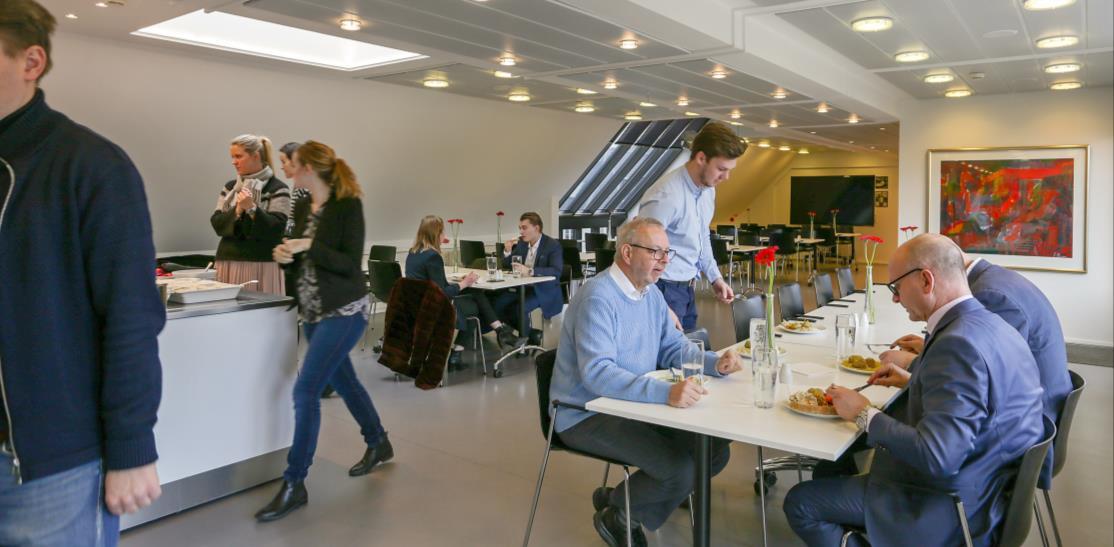
Remuneration and Collective Agreements
Remuneration
We strive for a fair and responsible approach to pay and remuneration that reflects the employees' functions, responsibilities and contributions to the company. All employees are employed on individual contracts, and salary determination is based on the nature of the position, experience and market conditions. All real estate and commercial agents have the same commission rates regardless of gender and level of experience.
As part of our work to strengthen insight into pay conditions, we have, for the first time, carried out a statement of average pay differences between male and female employees across selected employee groups. The analysis shows an average salary gap of 5% among brokers, while sales coordinators have a salary gap of -1%. A negative pay gap indicates that women on average, receive a higher salary than men in the group in question.
For staff functions and other employee categories, it is difficult to compare the salary level, as this category covers a wide range of tasks with great variation in responsibility, educational background and the nature of the work. Due to the large variation in administration, it has therefore been decided to omit the pay difference for staff functions and other employee categories in this statement.
It is important to note that the analysis is based on average salary paid and does not take into account task types or individual agreements. The results should therefore be seen as a first step in an ongoing effort to gain better insight into the company's salary structure.
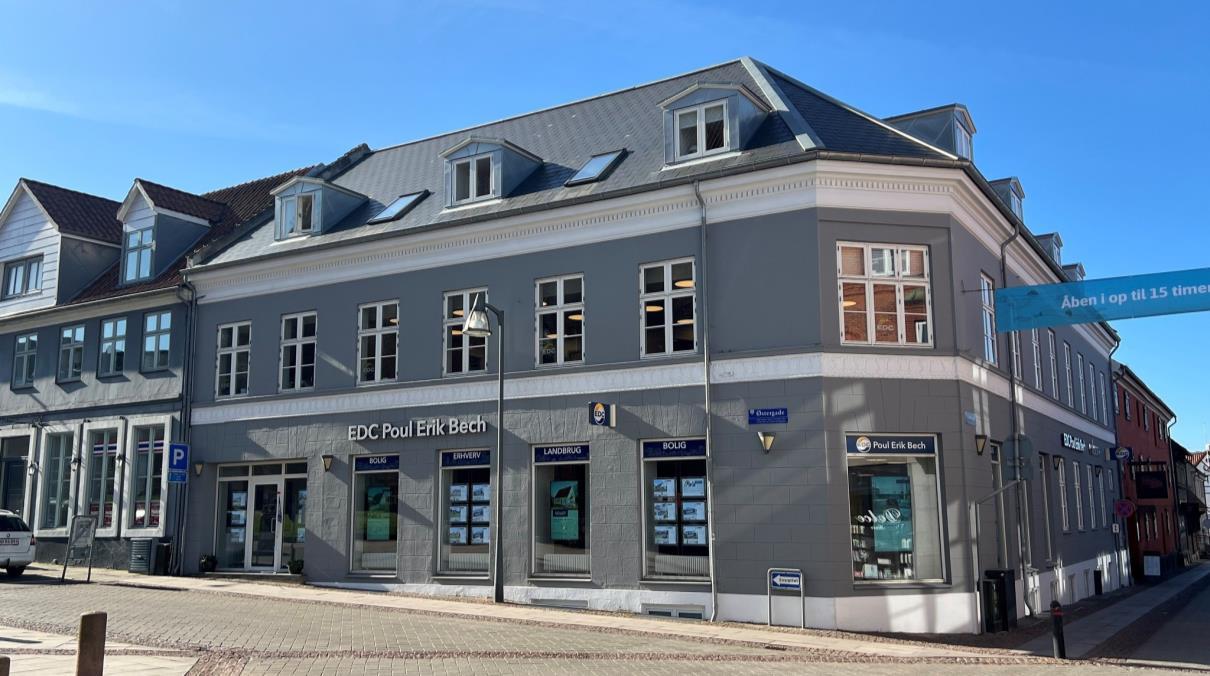
Agreements
Wage gap between male and female employees (percentage difference in average wages paid) Wage gap among the brokers
Wage gap for sales coordinators
At EDC Poul Erik Bech, 0% of the employees are covered by a collective agreement. This reflects the general practice in the real estate industry in Denmark, where collective agreement coverage is not widespread. The industry is characterised by individual employment contracts, where pay and working conditions are determined directly between employer and employee.
In Denmark, there is no legal obligation to be covered by a collective agreement, and it is common for companies in the private sector – including the real estate industry – to operate without formal collective agreements. Instead, the emphasis is on flexible and individually adapted agreements that take into account the individual employee's role, experience and performance.
Education
Focus on employee development
We consider the professional and personal development of our employees to be a cornerstone of our business strategy and social responsibility. We strive to be the real estate company in Denmark that offers the best development and career opportunities.
We believe that we have established the industry's most comprehensive training and continuing education programme, which ensures that both new and experienced employees continuously strengthen their skills. At the end of 2024, we employed 276 real estate agents MDE. This is a direct result of our targeted investment in training and talent development.
All agents and coordinators are covered by the Danish Association of Real Estate Agents' continuing education requirements, which stipulate that the
individual employee must obtain 24 DE points over a two-year period, corresponding to 12 x 45 minutes of teaching annually.
LEA Ejendomspartner, which employs a large group of property managers, is a member of EjendomDenmark. Here, you commit to completing a minimum of 32 hours of continuing education per employee over a three-year period – an obligation we fully live up to.
We also have a wide range of educational initiatives that go beyond the official requirements of DE and ED.
In addition, several employees have individual agreements on management training and specialized courses that support their career development.
Collaboration with educational institutions and talent development
We have also established a close collaboration with educational institutions that offer basic training for the real estate profession. Through school visits, internships and study-relevant part-time positions, we actively contribute to educating and integrating the real estate agents of the future. In 2024, 10 trainees completed their two-year course with usand 90% of them subsequently became permanent employees. This testifies to a strong and sustainable talent pipeline, where mutual trust and knowledge form the basis for long-term employment.
Focus on ESG competencies and sustainability
In line with the increasing importance of sustainability and responsible stewardship, we have also intensified our focus on ESG competencies. We have held three specialized courses for employees
Brokers and coordinators: 9 hours
LEA Ejendomspartner: additional 10.7 hours
Brokers and coordinators: 9 hours
LEA Ejendomspartner: additional 10.7 hours
focusing on basic understanding of ESG and the EU taxonomy; certification schemes such as DGNB, BREEAM, LEED, Swan-labelled, WELL and WiredScore; circular economy in the real estate industry; local planning and the importance of sustainability for the attractiveness of properties; as well as ESG-related legislation and governance
In addition, we have established an ESG Committee, where one of our employees has completed training in ESG skills. These competencies are crucial for us to be able to offer our customers services such as green leases, ESG due diligence and preparing ESG reports.
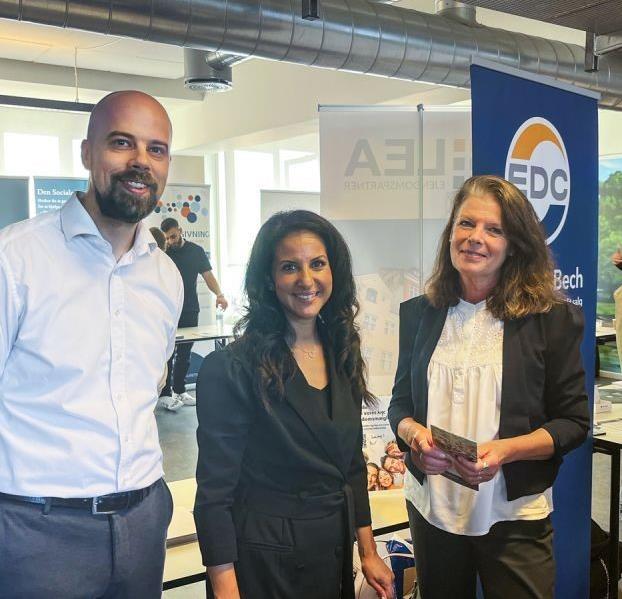
Average training hours per employee in 2024
Male employees
Female employees
Human Rights Policies and Processes, and Severe Negative Human Rights Incidents

Human rights policies
EDC Poul Erik Bech has a formal Code of Conduct that forms the basis for the company's social, ethical and professional standards. The policy is anchored in international guidelines such as the UN Guiding Principles on Business and Human Rights, the OECD's Guidelines for Multinational Enterprises and the UN Global Compact's 10 principles. It covers the following areas:
Child labour: The company clearly distances itself from child labour and does not cooperate with actors who participate in or support it.
Forced labour and human trafficking: Any form of modern slavery, forced labour and human trafficking is unacceptable, and the company undertakes to ensure that such conditions do not occur in its own operations or among business partners.
Discrimination: No forms of discrimination will be tolerated. Equality and respect are fundamental principles in the company's approach to employees and business partners.
Prevention of occupational accidents: The working environment is given high priority through ergonomic workplaces, varying work tasks, statutory workplace assessments and monthly well-being surveys via the Wellbeing Compass.
Whistleblower scheme: A whistleblower scheme has been established in accordance with applicable legislation, which allows employees to confidentially report breaches or potential breaches of legislation or internal guidelines.
Anti-corruption: The company has a zerotolerance policy towards corruption, bribery, and financial support for political parties. Anti-corruption is an integral part of the internal training, and the company complies with relevant legislation and ethical guidelines, including the anti-money laundering legislation.
We thus have a comprehensive and responsible approach to human rights and working conditions, supported by concrete policies and mechanisms that ensure implementation and follow-up in practice.
Human rights incidents
We can confirm that there have been no recorded incidents related to human rights violations in our own workforce. This includes areas such as child labour, forced labour, human trafficking, discrimination or other serious matters. The company has established clear policies and internal processes that actively prevent such incidents.
The company is also not aware of any confirmed incidents in the value chain among affected communities, consumers or endusers.
Giving Back to Society – The EDC Poul Erik Bech Foundation’s Contributions and Efforts
Social responsibility as part of our DNA
At the EDC Poul Erik Bech Foundation, the desire to give back to society is not just an ambition – it is a cornerstone of our existence. The foundation was established with the aim of supporting non-profit and cultural purposes, with a particular focus on children and young people in vulnerable positions. Through the profits from EDC Poul Erik Bech brokerage, funds are channelled directly into local communities across Denmark, where they make a tangible difference. Social responsibility is not something we take on – it is something we are.
In 2024, the Foundation has continued and expanded its involvement in a large number of projects, all of which have in common that they create value for people and communities. We have supported associations that work with children and young people who need extra support to be able to participate in leisure activities, get a good start to school or simply experience security and presence in everyday life. Our support is given directly to the end user and prioritises projects where volunteers are the driving force behind it. We believe that the most sustainable change is created from the bottom up – by people who know their local area and are passionate about making a difference.
Targeted support for children and young people
One of the most significant collaborations in 2024 has been with BROEN Denmark, which through 33 local associations helps children from financially
needy families to become part of the local association life. It's not just about sports and leisure, but about giving children access to communities where they can grow, develop and feel included. BROEN's volunteers make a difference every day, and we are happy to contribute an additional DKK 1.05 million in 2024 to their work. Our support helps to ensure that even more children have the opportunity to participate in activities that strengthen well-being, self-esteem and social relationships.
Another key focus area is the School Start Aid project, which we support through Danish People's Aid. The project ensures that children from vulnerable families get the necessary equipment and clothes to start school on an equal footing with their peers. A good start to school is crucial for the child's well-being and learning, and we believe that no child should feel left out because of the family's finances. With the school start aid, the child can choose their own school bag, pencil case, lunch box, learning aids, clothes, etc. - all with the aim of giving the child a safe and dignified start to school life. Our five-year support of DKK 6 million for the project makes it possible to plan long-term and reach even more children every year. In 2024, the efforts have been continued with great effect.

Poul
We support those who make a difference for others

Erik Bech Foundation
Giving Back to Society – The EDC Poul Erik Bech Foundation’s Contributions and Efforts —
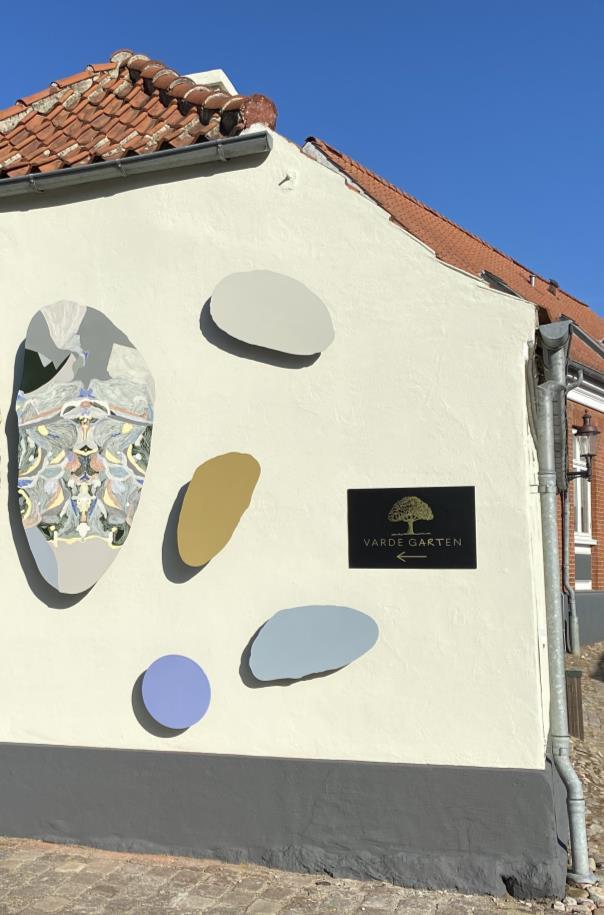
Cultural and artistic activities
In addition to the social initiatives, the foundation also has a strong cultural commitment. Since 2018, the EDC Poul Erik Bech Foundation's Art Prize has been awarded to one or two newly graduated artists from the Royal Danish Academy of Fine Arts. The award is a recognition of artistic talent and is intended to give young artists a financial and professional boost at the start of their careers. We believe that art has an important role in society – not only as an aesthetic expression, but as a source of reflection, dialogue and community. The Art Prize is part of our ambition to strengthen the role of art in society and support young talents in a crucial phase of their work.
Our cultural commitment is also expressed in Varde, where the foundation has contributed to turning the town into a vibrant outdoor art museum since 2017. In collaboration with the municipality and local actors, we have donated over 100 works of art to the city centre and the Art Garden. In 2024, the work has continued, and we see it as an investment in both cultural heritage and local identity. We believe that art in public spaces can help strengthen the community and create new meetings between people. Our vision is that art should be accessible to everyone – not only in the big cities, but also in smaller communities where it can have a special meaning.

Long-term thinking
The foundation's work is made possible by an ownership structure, where 60% of EDC Poul Erik Bech Holding A/S is owned by the foundation, while the rest is divided between the founder and his daughter. The structure ensures that we can think long-term and independent of short-term economic considerations. This means that we can prioritise people over profit – even in periods of economic headwinds. The Foundation's Board of Directors works unpaid, and we have a clear ambition to maintain and develop our social and cultural commitment in the years to come. In 2024, the foundation distributed 64 local donations, and we already intend to continue and expand the work in 2025.
We want to be a stable and present support for the many volunteers and associations who work every day to make a difference. Our focus will continue to be on children and young people, on community and on creating opportunities for those who have the fewest. We will also continue to support arts and culture because we believe that it helps to create vibrant and inclusive communities.
In addition to the EDC Poul Erik Bech Foundation, the founder has established two additional foundations: Ketty and Poul Erik Bech's Almennyttige Fond, which supports children's institutions, students, people affected by
accidents, musical and cultural initiatives, and the Relief Fund, which provides support to current and former employees who have ended up in difficult situations. These funds complement the work of the main fund and help to ensure that the aid reaches a wide audience – both to society and to those who have been part of the company.
We look forward to continuing our work in 2025 with the same dedication and commitment. We will continue to support the initiatives that create joy and security, as our donations make a difference.
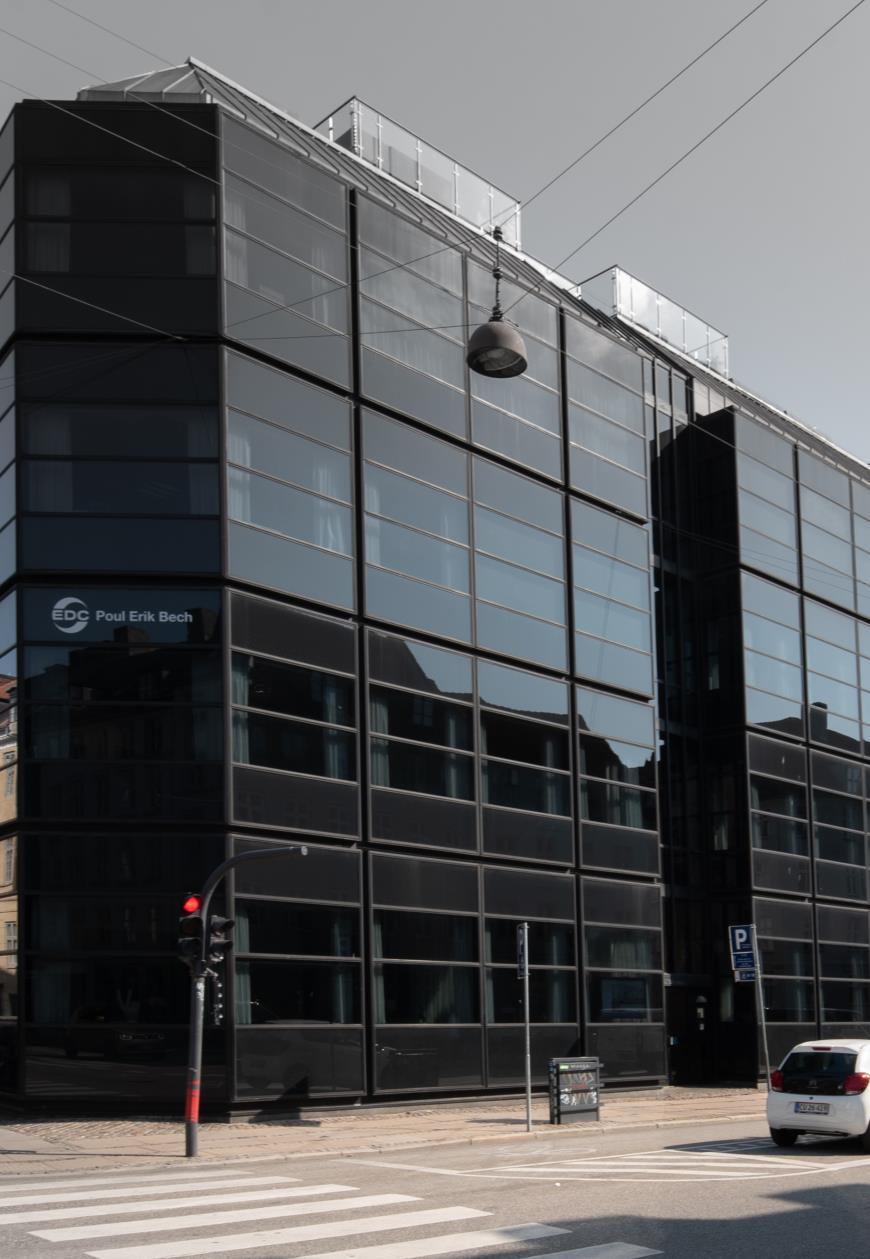
Includes VSMEs: C6 — Human rights policies and processes
C9 — Gender balance highest governance body
Corporate Governance
GDPR, Money Laundering and Anti-Corruption Policy
We prioritise compliance with the General Data Protection Regulation (GDPR) in our commitment to protect the safety and rights of our employees and customers. Responsible data processing is an integral part of our daily practice and an area we spend a lot of resources adhering to. We consistently oppose all forms of corruption and financial crime. Our company is built on a foundation of integrity, and we categorically reject bribery, corruption, and any form of financial fraud. There have been no fines or convictions related to corruption and bribery.
We strive to maintain the high standards of ethical behaviour and transparency so that our business practices are always in line with our values. By distancing ourselves from corruption and ensuring that our data processing is responsible, we create an environment where our employees and customers can feel safe and secure in working with us.
Whistleblower scheme
We follow the EDC Group's ambition that our corporate culture should be characterised by a high degree of transparency, credibility and openness.
In accordance with the Act on the Protection of Whistleblowers (the "Whistleblower Act"), the Act on Preventive Measures against Money Laundering and Terrorist Financing (the "Money Laundering Act") and the "Whistleblower Directive" (Directive (EU) 2019/1937 of the European Parliament and of the Council of 23 October 2019 on the protection of persons who report breaches of EU law), EDC is obliged to have a whistleblower scheme, i.e. a scheme where the
company's employees can report breaches or potential breaches (both acts and omissions) in the following areas, among others:
- Violations or potential violations of the Money Laundering Act.
- Breaches of any duty of confidentiality.
- Misuse of financial resources.
Theft, fraud, embezzlement, fraud and bribery.
- Serious or repeated offences.
- Sexual harassment or other serious personal conflicts in the workplace, e.g. serious harassment, gender discrimination, assault, violence, etc.
In the past year, there have been no reported cases to the whistleblower scheme.
RICS Certification
In 2011, EDC Erhverv Poul Erik Bech was admitted as a company member of the organisation RICS (the Royal Institute of Chartered Surveyors). RICS is an international organisation founded in England in 1868 and has approximately 125,000 members in 146 countries and aims to ensure the highest possible professional level, associated with very strong requirements for ethics and morals in the exercise of its members' activities. Our RICS certification is a confirmation that we live up to the strictest international requirements for "excellence and integrity" in our consultancy. This means that Danish as well as international customers can safely come to us because they know that we live up to the highest ethical and professional requirements for a modern, internationally oriented brokerage business.
The management structure of the group
Corporate Governance — continued
Management structure
The Group is owned by the EDC Poul Erik Bech Foundation and the private holding company PEBJB Holding A/S. The combination of foundation ownership and private ownership ensures a long-term and value-based perspective on the company's development. The operating companies within housing, commercial, property management and real estate investment are each organised with their own management teams and boards. It supports a decentralised decision-making structure with strong local roots and ensures that strategic and operational decisions are made close to the markets and customers they relate to.
Gender composition in management
For us, it is a fundamental principle that management and board positions are filled on the basis of professional qualifications, experience and the ability to contribute to the company's development. The selection is made regardless of gender and with a focus on ensuring the best possible combination of competences. The current report shows that there are differences in gender representation across the Group's management levels, including in the Board of Directors of EDC Poul Erik Bech Holding A/S. We follow the development of the gender distribution with attention and work actively to ensure that our management structure reflects the company's values and supports an inclusive culture where everyone is assessed on equal terms.
Fund management
The EDC Poul Erik Bech Foundation follows the Danish Business Authority's recommendations for good foundation management, which are aimed at commercial foundations and has completed a form for "Statutory account of good foundation management, cf. section 77 a of the Danish Financial Statements Act". Credibility must characterise the EDC Poul Erik Bech Foundation, and we want to achieve this through transparency about the Foundation's work. Therefore, it is possible to read about all the foundation's projects on the website and also often in the press.
Business and product groups
We have implemented effective practices to promote collaboration, knowledge sharing and problem-solving across our various departments and business centres across Denmark. We achieve this by creating business and product groups that meet frequently. The meetings serve as important platforms for our teams to exchange valuable experiences and best practices. Here, our employees have the opportunity to share advice and discuss specific cases to find the best possible solutions. Our management actively benefits from the input and recommendations that come out of these meetings, and they apply these insights to make decisions that affect the future course of our company. Our business and product groups are critical to our decision-making process and play a major role in shaping the direction and success of our company.
Gender diversity
members of the board
Accounting Policies
ESG inventory
The inventory is built around the basic module and the extended module of the voluntary sustainability reporting standard (VSME) for SMEs. It therefore follows the standard's practices for how data points should be calculated on the parameters that are deemed relevant to include in the reporting. The delimitation for the statement is the operational control method, as EDC Poul Erik Bech controls the daily operations of his organisation and therefore has direct control over all activities in connection with business operations.
Climate accounting
For the climate accounting part with energy consumption and CO₂e emissions, the Greenhouse Gas (GHG) Protocol has been used, including inventory categories within the various scopes and the underlying principles that require climate accounts to be relevant, complete, consistent, transparent and accurate.
Climate impacts
The reporting of the climate impact in this year's ESG statement includes direct energy consumption (Scope 1), indirect energy consumption (Scope 2) and the value chain's indirect consumption – all calculated in CO₂ equivalents. The calculation is based on energy consumption and emission factors. The CO₂e intensity is calculated as the ratio between climate impact and parameters such as turnover
and number of employees. Scope 2 is calculated both location- and market-based. The locationbased method is based on electricity emissions in the relevant municipality, while the market-based method takes into account the purchase of certificates and national average market-based emissions.
Climate impacts in Scope 1
Scope 1 impacts originate from the category "Technical installations", which includes the combustion of oil and natural gas at the site. At EDC, these energy sources are primarily used for space heating. The climate impact is calculated by multiplying the energy consumption by an emission factor, which indicates the emissions per unit of energy. Emission factors and calorific values for unit conversions are derived from the Mandatory Standard Assumptions of 10 January 2024 from the Danish Energy Agency.
Location-based climate impacts in Scope 2
The consumption in Scope 2 includes electricity and district heating. When calculating emissions according to the location-based method, a specific emission factor is used for each location, based on the municipality where the location is located. The emission factors, which indicate emissions per energy consumption, are stated in Energinet's Environmental Product Declaration. The emissions related to electricity consumption are calculated by multiplying the total electricity consumption at the individual location by the
associated emission factor. For district heating, a similar method is used, where emissions are calculated based on energy consumption and an emission factor that depends on the district heating plant that supplies heat to the location. These factors are stated in the respective district heating declarations.
Data quality
Data quality is crucial for the fairness and usability of the climate accounts. In the report, the data quality is assessed as moderate, as there is a difference in the precision of the data sources used.
Electricity consumption is based on specific measurements, which provides high accuracy. On the other hand, the consumption of district heating, natural gas and oil is calculated on the basis of invoices and annual statements, which are generally less precise. For some locations, data for district heating have been insufficient or completely missing, which has necessitated estimations. This leads to uncertainty and will be a key focus area in the work to improve data quality.
Environment
For the remaining reporting points in the environmental reporting, data has been obtained where available. This applies primarily to EDC's head office and to a lesser extent to its own locations. Due to limited data availability, the report is not fully comprehensive. Therefore, in
the future, systematic work must be done to collect data from locations where it is currently lacking and to prepare qualified estimates where data cannot be obtained, to ensure a more accurate and consistent statement.
Social and Governance
Data for the social and governance-related reporting areas has been collected by EDC Poul Erik Bech to meet the assessed relevant requirements in both the basic and extended modules of the VSME standard. In addition, additional calculations have been made under the social data points, as the company has a number of relevant initiatives that are considered important to include. This includes employee retention, work-life balance, employee satisfaction and the EDC Poul Erik Bech Foundation's work and contribution to society.
In the current ESG statement, the company has chosen to calculate the salary difference for brokers and sales coordinators, as these functions are considered to be the most directly comparable. To ensure a more accurate picture of the salary conditions throughout the organisation, NGS recommends that the statement be expanded to include all job categories included in the reporting. This can be done, for example, by including administrative functions in the analysis or by supplementing with an overall statement of pay differences at group level to include everyone.

Prepared for EDC Poul Erik Bech Holding A/S Bremerholm 29 1069 København K CVR-nr.: 36456396 +45 33 30 10 00 www.poulerikbech.dk Prepared by Nordic Green Solutions A/S Randersvej 2A 8600 Silkeborg CVR-nr.: 42832146 +45 86837483 www.ngs.dk
Appendix – Subsidiaries Included in the Reporting
Subsidiaries included in this ESG statement
Name of subsidiary Registered address of subsidiary
Ejendomsmægleraktieselskabet Poul Erik Bech
EDC Poul Erik Bech, Næstved A/S
EDC Poul Erik Bech, Sønderborg A/S
EDC Poul Erik Bech, Guderup A/S
EDC Poul Erik Bech, Allerød A/S
EDC Torben Larsen A/S
EDC Poul Erik Bech, Randers A/S
EDC Poul Erik Bech, Tune A/S
EDC Poul Erik Bech, Køge A/S
EDC Poul Erik Bech, Faxe ApS
EDC Poul Erik Bech, Vordingborg A/S
EDC Poul Erik Bech, Vanløse A/S
EDC Poul Erik Bech, Rødovre A/S
EDC Poul Erik Bech, Silkeborg A/S
EDC Poul Erik Bech, Helsingør A/S
Bremerholm 29, 1069 København K
Bremerholm 29, 1069 København K
Bremerholm 29, 1069 København K
Bremerholm 29, 1069 København K
Bremerholm 29, 1069 København K
Frederiksberggade 11, 8600 Silkeborg
Bremerholm 29, 1069 København K
Bremerholm 29, 1069 København K
Bremerholm 29, 1069 København K
Bremerholm 29, 1069 København K
Bremerholm 29, 1069 København K
Bremerholm 29, 1069 København K
Bremerholm 29, 1069 København K
Bremerholm 29, 1069 København K
Bremerholm 29, 1069 København K
EDC Poul Erik Bech, Viborg A/S Bremerholm 29, 1069 København K
EDC Poul Erik Bech, Rødby A/S
Bremerholm 29, 1069 København K
Subsidiaries included in this ESG statement
Name of subsidiary Registered address of subsidiary
EDC Poul Erik Bech, Hørsholm A/S Bremerholm 29, 1069 København K
EDC Poul Erik Bech, Falkoner Alle A/S Bremerholm 29, 1069 København K
EDC Poul Erik Bech, Frederikssund A/S Bremerholm 29, 1069 København K
EDC Poul Erik Bech, Karrebæksminde A/S Bremerholm 29, 1069 København K
EDC Poul Erik Bech, Gl. Kongevej A/S Bremerholm 29, 1069 København K
EDC Poul Erik Bech, Godthåbsvej A/S Bremerholm 29, 1069 København K
EDC Poul Erik Bech, Aalborg A/S Bremerholm 29, 1069 København K
EDC Poul Erik Bech, Roskilde A/S Bremerholm 29, 1069 København K
EDC Poul Erik Bech, Odense C A/S Bremerholm 29, 1069 København K
EDC Poul Erik Bech, Aabenraa A/S Bremerholm 29, 1069 København K
EDC Poul Erik Bech, Holmbladsgade A/S Bremerholm 29, 1069 København K
EDC Poul Erik Bech, Slagelse A/S Bremerholm 29, 1069 København K
EDC Poul Erik Bech, Gentofte A/S Bremerholm 29, 1069 København K
EDC Poul Erik Bech, Maribo A/S Bremerholm 29, 1069 København K
EDC Poul Erik Bech, Greve A/S Bremerholm 29, 1069 København K
EDC Poul Erik Bech, Rødekro A/S Bremerholm 29, 1069 København K
EDC Poul Erik Bech, Esbjerg og Hjerting A/S Bremerholm 29, 1069 København K
Appendix – Subsidiaries Included in the Reporting
Subsidiaries included in this ESG statement
EDC Poul Erik Bech, Syndbyvester Plads A/S Bremerholm 29, 1069 København K
EDC Poul Erik Bech, Ørestad A/S
EDC Poul Erik Bech, Hedehusene A/S
EDC Poul Erik Bech, Vallensbæk A/S
EDC Poul Erik Bech, Ishøj A/S
EDC Købermægler 1 ApS
EDC Poul Erik Bech, Valby A/S
EDC Poul Erik Bech, Hvidovre A/S
EDC Poul Erik Bech, Jyllinge A/S
EDC Poul Erik Bech, Holbæk A/S
EDC Poul Erik Bech, Risskov A/S
EDC PEB AM Holding A/S
EDC Poul Erik Bech/Arne Madsen, Brønshøj
A/S
Bremerholm 29, 1069 København K
Bremerholm 29, 1069 København K
Bremerholm 29, 1069 København K
Bremerholm 29, 1069 København K
Bremerholm 29, 1069 København K
Bremerholm 29, 1069 København K
Bremerholm 29, 1069 København K
Bremerholm 29, 1069 København K
Bremerholm 29, 1069 København K
Bremerholm 29, 1069 København K
Bremerholm 29, 1069 København K
Bremerholm 29, 1069 København K
EDC Poul Erik Bech, Ballerup A/S Bremerholm 29, 1069 København K
EDC Poul Erik Bech, Nørrebro A/S Bremerholm 29, 1069 København K
EDC Poul Erik Bech, Herlev A/S Bremerholm 29, 1069 København K
EDC Poul Erik Bech, Virum ApS
Bremerholm 29, 1069 København K
Subsidiaries included in this ESG statement
Name
EDC Poul Erik Bech, Lyngby ApS Bremerholm 29, 1069 København K
EDC Poul Erik Bech, Dalum ApS Bremerholm 29, 1069 København K
EDC Poul Erik Bech, Næsby ApS Bremerholm 29, 1069 København K
EDC Poul Erik Bech, Middelfart ApS Bremerholm 29, 1069 København K
EDC Poul Erik Bech, Hundested A/S Bremerholm 29, 1069 København K
EDC Poul Erik Bech, Langeland A/S Bremerholm 29, 1069 København K
Holdingselskabet Poul Erik Bech Erhverv A/S Bremerholm 29, 1069 København K
EDC Erhverv Poul Erik Bech, Hillerød A/S Bremerholm 29, 1069 København K
EDC Erhverv Poul Erik Bech Trekantområdet, Kolding A/S Bremerholm 29, 1069 København K
EDC Erhverv Poul Erik Bech, Esbjerg A/S Bremerholm 29, 1069 København K
EDC Erhverv PEB Aalborg Holding A/S Bremerholm 29, 1069 København K
EDC Erhverv Poul Erik Bech, Aalborg P/S Bremerholm 29, 1069 København K
EDC Erhverv Poul Erik Bech, København P/S Bremerholm 29, 1069 København K
EDC Erhverv Poul Erik Bech, Fyn A/S Bremerholm 29, 1069 København K
La Cour & Lykke A/S Vingårdstræde 13, 1070 København K
EDC Poul Erik Bech, Taastrup P/S Bremerholm 29, 1069 København K
EDC Erhverv Poul Erik Bech/Ibo, Herlev A/S Bremerholm 29, 1069 København K
EDC Poul Erik Bech Holding
Appendix – Subsidiaries Included in the Reporting
Subsidiaries included in this ESG statement
Name
EDC Erhverv Poul Erik Bech Trekantområdet,
Vejle A/S
Bremerholm 29, 1069 København K
EDC Erhverv Poul Erik Bech, Silkeborg A/S Bremerholm 29, 1069 København K
EDC Erhverv Poul Erik Bech, Sønderjylland
P/S
Bremerholm 29, 1069 København K
EDC Erhverv Poul Erik Bech, Sjælland A/S Bremerholm 29, 1069 København K
EDC Erhverv Poul Erik Bech, Næstved A/S Bremerholm 29, 1069 København K
EDC Erhverv Poul Erik Bech, Roskilde A/S Bremerholm 29, 1069 København K
EDC Erhverv Poul Erik Bech, Slagelse A/S Bremerholm 29, 1069 København K
EDC Erhverv Poul Erik Bech, Køge A/S Bremerholm 29, 1069 København K
EDC Poul Erik Bech, Herning P/S Bremerholm 29, 1069 København K
EDC Landbrug Poul Erik Bech P/S Bremerholm 29, 1069 København K
EDC Erhverv Poul Erik Bech, Aarhus P/S Bremerholm 29, 1069 København K
Komplementarselskabet PEB ApS Bremerholm 29, 1069 København K
LEA Ejendomspartner A/S Bremerholm 31, 1069 København K
FBU Invest ApS Birkevænget 7, 3050 Humlebæk
IT2REAL ApS Bremerholm 29, 1069 København K
Ejendomsselskabet PEB ApS Dybensgade 6, 1071 København K
Subsidiaries included in this ESG statement
Name of subsidiary Registered address of subsidiary
EDC Poul Erik Bech, Gilleleje Bremerholm 29, 1069 København K
EDC Poul Erik Bech Holding
Appendix – Overview of Locations
Bremerholm 29 Bremerholm 29
Bremerholm 31 st. th. Bremerholm 31 st. th.
Bremerholm 31 2. sal Bremerholm 31 2. sal
Bremerholm 31 3. sal Bremerholm 31 3. sal
Kbh City Bremerholm 29
Godthåbsvej Godthåbsvej 117
Gl. Kongevej 135 Gl. Kongevej 135
Falkoner Alle Falkoner Allé 58
Østerbro Ndr. Frihavnsgade 41
Valby Ålholmvej 1
Nørrebro Nørrebrogade 230
Holmbladsgade 34 Holmbladsgade 34
Ørestad Ørestads Boulevard 61C, st.th.
Albertslund Bytorvet 31
Hedehusene Hovedgaden 502
Hvidovre Strandmarksvej 11
Solrød Solrød Center 63
Brønshøj Frederikssundsvej 211
Vanløse Jernbane Allé 77
Ishøj Vejlebrovej 114
Herlev Marielundvej 41, 1. th.
Gentofte Gentoftegade 72
Virum Grønnevej 79
Søborg Søborg Hovedgade 136
København K
København K
København K
København K
København K
Frederiksberg
Frederiksberg C
København Ø
Valby
2200 København N
2300 København S
2300 København S
2620 Albertslund
2640 Hedehusene
2650 Hvidovre
2680 Solrød Strand
2700 Brønshøj
2720 Vanløse
2635 Ishøj
2730 Herlev
2820 Gentofte
2830 Virum
2860 Søborg
55.67839, 12.58357
55.67806, 12.58380
12.58380
12.58380
55.67839, 12.58357
12.51941
12.54055
12.53717
55.70220, 12.58200
55.67048, 12.48981
55.70051, 12.53955
55.66483, 12.60586
55.63328, 12.58165
55.65627, 12.35459
55.64973, 12.19929
55.62845, 12.48656
55.53317, 12.21937
55.70581, 12.49005
55.69041, 12.48791
55.61208, 12.36270
55.71500, 12.42946
55.74542, 12.54071
55.79396, 12.47262
55.73806, 12.50807
Appendix – Overview of Locations
Sundbyvester Plads Sundbyvester Plads 2
Ballerup Centrumgaden 4
Taastrup Taastrup Hovedgade 115
Helsingør Stengade 70
København S
Ballerup
Taastrup
12.61347
55.73164, 12.36081
12.29959
12.61414 Frederiksværk Torvet 4
Hundested Nørregade 28
Hilerød Søndre Jernbanevej 18D
Frederikssund Ny Østergade 1A
Stenløse Byvej 29
Tune Center 8B
Roskilde Frederiksborgvej 65A
Faxe Vinkældertorvet 4
Køge Bjerggade 2B
Slagelse Bolig Korsørvej 2
Næstved Østergade 2
Vordingborg Valdemarstorvet 1
Nakskov Vejlegade 3
Rødby Havnegade 9, Rødbyhavn
Nyborg Korsgade 11
Odense C Vestre Stationsvej 25
Odense M Hjallesevej 116
Dalum Dalumvej 45
Næsby Bogensevej 53
Middelfart Odensevej 34
Frederiksværk
Hundested
Hillerød
Stenløse
Roskilde
4640 Faxe
4600 Køge
4200 Slagelse
4700 Næstved
4760 Vordingborg
4900 Nakskov
4970 Rødby
5800 Nyborg
5000 Odense C
5230 Odense M
5250 Odense SV
5270 Odense N
5500 Middelfart
12.02267
11.85058
12.30691
12.06245
12.20181
12.17762
55.65214, 12.08536
55.25732, 12.11973
55.45845, 12.18546
55.39720, 11.33960
55.22953, 11.76038
55.01097, 11.90740
54.83051, 11.13423
54.65934, 11.35453
55.31137, 10.79018
55.39566, 10.36976
55.38205, 10.39604
55.37018, 10.37108
55.41878, 10.35913
55.50265, 9.74284
Appendix – Overview of Locations
Langeland Østergade 60 5900 Rudkøbing
Kolding Bolig Jernbanegade 25
Aabenraa Rådhusgade 6
6000 Kolding
6200 Aabenraa
Rødekro Hærvejen 49 6230 Rødekro
Sønderborg Augustenborg Landevej 1 6400 Sønderborg
Esbjerg Kirkegade 9
6700 Esbjerg
Hjerting Gl. Guldagervej 9 6710 Esbjerg V
Herning Østergade 14 7400 Herning
Vejle Dæmningen 41A, 1
Vejle
Erhverv Aarhus Rådhuspladsen 3, mezz. 8000 Aarhus C
Risskov Ndr. Strandvej 90
Højbjerg Rosenvangs Alle 145
Silkeborg Østergade 28
Torben Larsen Bolig Frederiksberggade 11
Viborg Vestergade 24 - Nytorv
Randers Dytmærsken 18
Aalborg Vesterbro 101
Nørresundby Torvet 1
Skagen Sct. Laurentii Vej 63 C
Rødovre Jyllingevej 155
Vallensbæk Strand Vallensbæk Strandvej 286
Greve Hundige Strandvej 197
Lyngby Jernbanevej 15A
Hørsholm Usserød Kongevej 14
8240 Risskov
8270 Højbjerg
8600 Silkeborg
8600 Silkeborg
8800 Viborg
8900 Randers C
9000 Aalborg
9400 Nørresundby
9900 Frederikshavn
2610 Rødovre
2665 Vallensbæk Strand
2670 Greve
2800 Kongens Lyngby
2970 Hørsholm
54.93517, 10.71625
55.49017, 9.47746
55.04308, 9.41991
55.06937, 9.33518
54.91991, 9.80966
55.46566, 8.44887
55.52346, 8.35525
56.13587, 8.97776
55.71020, 9.53590
56.15334, 10.20346
56.19797, 10.25363
56.12172, 10.18844
56.17029, 9.55306
56.16361, 9.55132
56.45050, 9.40924
56.45946, 10.04029
57.05081, 9.91605
57.05843, 9.92309
57.72170, 10.58757
55.69159, 12.46337
55.61844, 12.38518
55.58500, 12.31977
55.77058, 12.50002
55.88263, 12.49862
Appendix – Overview of Locations
Amtsvej 2
Labæk 10
Gilleleje Hovedgade 17
Nørre Allé 6, Glostrup
Jyllingecentret
Appendix – Overview of Emission Factors
Appendix – Overview of Emission Factors
Appendix – Overview of Emission Factors
Appendix – Overview of Emission Factors
Appendix – Overview of Emission Factors
2.3
2.3
Appendix – Overview of Emission Factors
2.3
2.3
2.3
